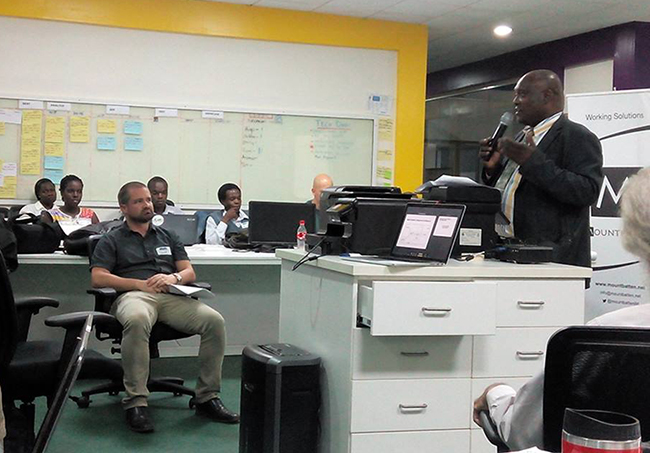Disclaimer: The statements and opinions expressed in this article are those of the author(s) and do not necessarily reflect the positions of Thoughtworks.

November’s topic at the Mobile Monday Kampala event could not have come sooner considering that the Ebola epidemic has ravaged the three western countries of Guinea, Liberia and Sierra Leone. Sadly, other outbreaks were also reported in Nigeria, Senegal and Mali over the last three months.
The World Health Organization (WHO) says although the official death toll is said to be hovering around 5,000, the number is likely to be three times higher. At least 244 healthcare workers are amongst those who lost their lives to this virus – a stark reminder that supporting frontline health workers is vital and there is a critical need to establish a more robust communication and data collection system between health workers and their supervisors as they address priority needs.
At the most recent Mobile Monday, hosted by Thoughtworks Kampala, the theme was How can mHealth Tools Help Contain an Outbreak. Dr. Mukooyo, Assistant Commissioner, Ministry of Health, gave a presentation detailing how the ministry is playing its part by focusing on providing the appropriate level of service anytime, everywhere for everyone.

He showcased one of the latest innovations, District Health Information System (DHIS), an open source, web-based software platform that captures, analyses and disseminates data. The Ministry is banking on this UNICEF-supported project to form a core pillar of the country’s eHealth Information System.
The stellar panel of speakers also included Edward Bichetero, the systems administrator at the ministry, who said the eHealth Information System has been useful in producing weekly surveillance reports on the most infectious diseases from all government health facilities in all the 112 districts of Uganda. He said that through the use of this system, all (government) health facilities have to deliver the reports to the MoH every Monday morning. Ismail Wadembere, informatics manager at Intrahealth, an organisation that is implementing the USAID-Uganda Strengthening Human Resources for Health project, added that Rapid Pro is a tool that is being developed to serve as the national communications engine, pulling in data from health workforce registries and sending data back into national databases such as DHISI.
Many mobile health experts also say that the improved visibility afforded by these tools and adoption of emerging standards will allow integration of systems to provide enterprise level management of healthcare and better preparedness for earlier detection of possible outbreaks by improved surveillance methods and, in turn, enable a smarter, more rapid response by health officials to any perceived threat.
Thoughtworkers Jeff Xiong and Nimrod Wandera also gave a presentation titled Building High Quality Health IT Systems: Method and Technology during which they detailed the importance of following software development best practices like user research and continuous delivery. They emphasised the importance of keeping the user engaged and happy so as to keep a project such as this one alive.
The good news is that in the next three months, the ministry, with help from its technology partners with ideation, design and software delivery, will deploy the community healthcare management system in some districts as a pilot project. The tools are supposed to dramatically improve the appalling health indices in Uganda.
The hope is that the more circumspect view afforded by the use of these new tools, in adherence to the new standards, will allow for earlier detection of possible outbreaks, by better surveillance methods which will in turn enable smarter, more rapid responses by officials to contain the threat of an outbreak.
As Liberia’s President said in her moving letter to the world, “A thousand words leave not the same deep impression as does a single deed.”
Disclaimer: The statements and opinions expressed in this article are those of the author(s) and do not necessarily reflect the positions of Thoughtworks.
